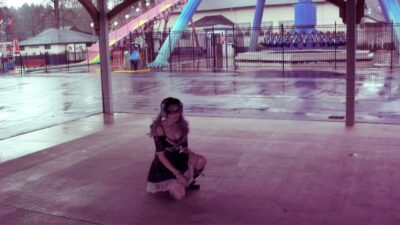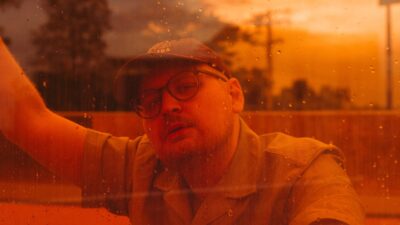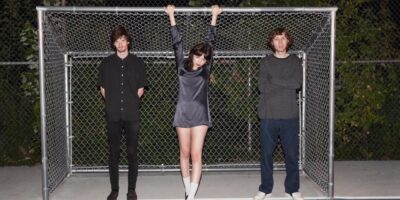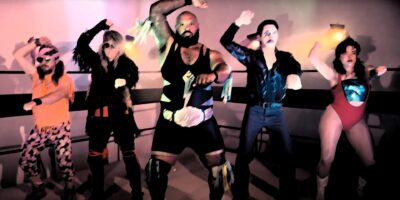After making their presence known with a series of EPs over the last several years, North Carolina-via-California-based artist Teens in Trouble are finally issuing their debut LP on the illustrious Asian Man Records. Luke Phillips chats with Lizzie Killian about the minutiae and the personal themes inherent to WHAT’S MINE, musical collaboration, music videos, driving anxiety, and the nature of playlisting.
So you can think of debut albums in a couple of ways: for some people it’s like a statement, you know, like, “This is who we are,” planting your flag in your own sound. Some people kind of arrive fully formed at that. Some people it’s more of like a template, something to build off of. Or it’s like a snapshot—“This is where I am in my life right now”—and you’re just sharing it. You’re sharing that moment in time, that memory. How do you kind of conceive of it?
Lizzie Killian: I guess it’s a little bit of a few of those elements. Since this is our debut and our first full-length, it does feel like a statement of, like, “This is who we are.” But it’s also, “This is who we are right now.” I’ve been in a bunch of different bands ever since I was in High School, but I’ve never really put out my own full-length. I have put out a full-length with another band before, but I was just playing guitar and sort of, you know, not really the primary person. So this feels significant to me personally, where it’s like, “Here are our 10 songs that I wrote.”
When I started Teens in Trouble, I used it as a canvas or a playground to figure out what my own sound and style was. Like, I’ve always been in bands where it was a little more democratic. This is my first project that was my vision—I was coming from different punk bands and I wanted to figure out what else I can do. Most of the stuff I’ve done in the past I was just playing a bunch of power chords. So this is my first time trying to lean in and figure out what my capabilities and limits are. I think with this album, I’m really trying to get out of my comfort zone a little bit. There’s some songs where I sort of challenged myself in terms of the vocal performance. In comparison to the debut EP that came out a couple years ago—in hindsight the EP is more reserved—I was like, “Okay, let’s just try some weird stuff. Like really go for it.” So that’s sort of where it’s at right now. You know, whatever I come up with next I feel like I’ve developed so many new skills since this album. So maybe the next album will be a different statement.
You can kind of trace that between, like, your first couple EPs and the collab you did with Desert Mambas. The first couple EPs definitely have more of an indie rock lean to them. Then gradually, you’re developing it and bringing in more of the punk background that you have. The progression is there—it’s really cool.
LK: I did go back a little bit when we finally finished, like all the mastering and everything for the album, I went back to listen to my very first single, “Santa Monica,” from, like, 2015 and then, like, listened through the first EP, through the split, and then the full-length. I was like, “Whoa.” It’s interesting how that changes over time. I’m really proud of this album and for challenging myself and going for it. The debut LP has more of its own identity and attitude. Totally. It feels a lot more confident.
That’s about as much as you can possibly want, right? From your debut record as your own project, right? Speaking about, like, collaboration, not only on the Desert Mambas EP, but also Stefan from PUP is on this record. Do you plan on doing more collaborations in the future? Or do you want to keep it kind of just more like honed-in on kind of your own singular vision?
LK: I am interested in collaborating more with people. I think it’s a lot of fun and you end up coming up with ideas that maybe you wouldn’t have thought of on your own. With this being sort of my first project where I am leading a lot of this stuff, I feel like working with other people is still an important element. It sort of gets you out of your default thinking brain, especially with working with the people who recorded this album with me. I have Randy Moore, who produced the album, but also played bass and lead guitar on a lot of the tracks—he was there from the beginning of the debut EP in 2022. Being able to bounce ideas off of each other is super helpful. I’m really excited to collab with different artists that I haven’t before, just to see how that might work out, inspire a new idea, or make me try something new. I have a few people in mind that I’m excited to work with.
I won’t make you divulge that yet. Keep that in your back pocket.
LK: Even the stuff with Stefan from PUP—I had the song “You Don’t Want to Mess With Me” written and recorded, and it felt like he didn’t get looped in until a little bit later. The song was already fleshed-out for the most part, but then I felt like something was missing. For the way that the song was recorded, it needed some more angst in it. I feel like the angst element would strengthen the sound of that song. I was, like, “It needs to have that sort of PUP element.” So I just asked Stefan from PUP. I sent him the song and I was like, “Let me know what you think. It would be great if you could do vocals and guitar.” He was stoked about it and gave me back some guitar parts he recorded and backing vocals. We put them together and, like, holy shit, that’s exactly what was missing. It injected like this new energy into the song. That song rocks.
I really like the videos that you’ve done for the record. You utilized some really cool stop motion techniques in the “You Don’t Wanna Mess With Me” video. It reminds me of the “Teeny Little Super Guy” from SESAME STREET. Are you a fan of stop motion animation? How did that come about?
LK: My friend AjaPop put that video together. I’ve worked with her in the past. She’s my best friend, so I’ve known her for a really long time, but she’s also done the “Decomposing” video for me from the last EP. Usually when I’m working with other people on music videos, I try to defer to them on what they want to do. My friend Kyle Broom, who did the “I’m Not Worried” video and the “It’s Up to Me” video, I just sort of let him come up with an idea based on the song. He’s a huge Kubrick fan and loves 2001: A SPACE ODYSSEY. When he came up with “I’m Not Worried,” he really wanted to have the space theme. When you give them that sort of creative freedom, they do their best work because within the realm of what they want to do.
For the stop motion one, Aja really wanted to do stop motion because it sort of complemented the sort of “angularness” of the guitars in “You Don’t Want To Mess With Me” sound. I felt like that sort of visual with the song went well together. The thing that I didn’t realize was that it was going to be an entirely stop motion video—I thought we were going to maybe have some parts that were stop motion, but we ended up making the whole video that way. And it was challenging to do, but really fun. I basically had to spend three days out in public making these weird poses for a long time. And everybody’s looking. It was a little bit embarrassing, but it was fun, too. Challenge yourself a little bit. The end product looks great. So it was all work that I did. There was a bunch of people who came up to us. They’re like, “What are you guys doing?”
I love the shot where you’re with your dog, circling around you.
LK: That’s because he cannot stand still. But it totally works. I try to include him in all the things that I’m doing, which is a little silly, but I like the callback. He’s obviously in the “I’m Not Worried” video because he’s my co-pilot. You can see him for like a split second in the “It’s Up to Me” video where I’m putting laundry into the dryer, and you just see him in the corner. He’s also on the cover of the debut album and “Santa Monica,” the seven-inch I put out.
On “Autopilot,” you use driving metaphors to allude to anxiety. Does driving itself give you anxiety? Personally, I literally don’t drive because it stresses me out too much.
LK: I lived in LA for a couple years and it definitely made me anxious to drive. I think I’m a decent driver overall. I’m from the Bay Area, and that’s not a super easy place to drive, especially in San Francisco, but then LA was like another level.
I’m from Michigan, where I feel like everyone is expected to follow the rules of the road. Michigan is such a car-centric state and culture. You get teased if you’re a bad driver. In LA it’s like you’re in MAD MAX—everyone for themselves.
LK: I live in North Carolina and it’s so much easier to drive out here. We just did a week-long little run of shows on the West Coast last week and we had a show in LA. Thankfully, our lead guitarist was driving everywhere. When that tour wrapped, Aja was on tour with us doing video, and she had a flight back home. She asked if I could take her to the airport, and I, like, froze up for a second because, like, “I have to drive in LA??”
It’s just always a horrifying prospect. One of my favorite songs on the record is “Playlist.” Can you speak more to how you feel about the emotional connection of playlists and the context within the song itself?
LK: The song “Playlist” came about because I like how when people put playlists together, it’s sort of a window into who they are and what they’re about. It always feels when someone sends you a playlist, it’s this intimate sort of thing. Now I know a little bit more about this person. You start to hear songs in a different context, or maybe there’s a song on the playlist that you’ve heard before, but in the context of that specific playlist made by that specific person, you’re, like, “Ooh, cool.” You can definitely get inside their head a little more with that revelation. This is sort of even the way that I ordered the album. There’s a flow to the album that in my mind makes sense.
One time my friend asked me if I could put a playlist together for them for their runs. And so I was trying to think about, like, okay, you know, you don’t want to start sprinting right away. So maybe, first you put a song that has a good tempo, but it starts to build up, and then it starts to speed up over the middle and then slow down when your run is winding down now. So that’s sort of a similar thing.
That’s great. It makes total sense that the same part of your brain that is putting together the flow of a playlist also naturally is how you put together the flow of a track list for the album itself.
LK: That’s a good point. And that’s what I think is, like, the cool and fun thing about albums as a sort of journey. Because of streaming services and things like that, there’s maybe not as much of a focus on the way albums are presented. I know obviously people still put out albums, but it’s easier to forget when you hear so many singles or you’re hearing songs randomly on a playlist.
There’s a reason that people talk about, you know, songs working in the context of the album, right? To bring everything full circle, what are some of your favorite debut albums, past and present?
LK: Oh, well, I guess one that I cannot not say is Weezer’s BLUE ALBUM. How do you even just come out with an album like that off the bat? Spiritual Cramp is one of the newer ones I’ve been into. They put out a debut album like a few months ago, it’s awesome. Technically, like, that’s not their first album. But this is their debut. So I get it. I mean, my album is my actual first full-length too, I feel like you only have one chance at “a debut album.” So that’s why I wanted to just one-shot go hard with it.
BLUE ALBUM is the standard definition, right? I mean, they’re doing the tour this year, for the 30th anniversary.
LK: Oh, I got tickets yesterday. I was like, I have to.
I mean, they did that tour in 2010. Yeah, the Memories Tour. I was there.
Yeah, me too.
The BLUE ALBUM one and the PINKERTON one are, like, the best music shows I’ve ever seen.
LK: Oh yeah, absolutely.
LK: I went to the Chicago show for the BLUE ALBUM and I had tickets to PINKERTON—I prefer BLUE ALBUM to PINKERTON, but I think the PINKERTON B-sides are the best Weezer songs.
LK: Oh, those are so good. The PINKERTON B-sides are just so top-tier. Oh my god. I was thinking about those B-sides a lot—with some of these songs, I mean, I’m sure you could hear some of the influences on “Autopilot” or “Playlist.”
Oh, definitely. There’s that “You Gave Your Love to Me Softly” vibe. The Rentals keyboard lines.
LK: This was the first time we really used synths in any of our songs. It was cool. I was excited to do that. Being a fan of that era of Weezer and revisiting it in that way was doing great things to my ears.
You’re keeping the Pinkerton B-sides vibes alive. Glad to have someone doing it. There’s something to be said when Asian-American women take the Rivers Cuomo sound and use it in their own name. Seems like his worst nightmare.
LK: *Laughs* Maybe, uh, he’ll be excited about that and ask us to go on tour with him. No, absolutely not. I’m just kidding. But really, Rivers, I’m talking to you. If you read this, call me.
Rivers seems totally open to collaboration with anyone who asks, so I think you have a good shot!
You can check out Teens In Trouble’s excellent debut WHAT’S MINE over on Bandcamp!
















Comments